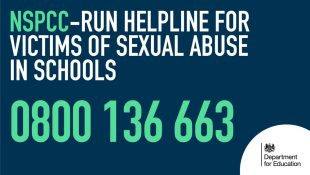
Sexual abuse in any form is unacceptable. Following the concerning reports provided to the Everyone’s Invited website, detailing incidents of sexual assault in schools and colleges, the Government is taking immediate steps to support to those affected and ensure all schools are safe places.
That is why we are working with the NSPCC to launch a dedicated helpline for victims of sexual abuse to provide support and guidance.
The dedicated NSPCC Helpline - Report Abuse in Education – launched today (Thursday 1 April) and can be contacted by phone on 0800 136 663, or by emailing help@nspcc.org.uk.
Here’s what you need to know about the helpline.
Who is the helpline for?
The new dedicated helpline will open from today to children, young people and adult victims of sexual abuse.
The helpline will be run by the NSPCC and will provide victims of abuse with the appropriate support, advice and onward action, including on contacting professionals or the police if they wish. The helpline will also provide support to parents and professionals too.
Everyone’s Invited, a place where victims are encouraged to record their experiences of sexual assault and abuse, will also signpost to the helpline from their website.
What will happen to the information that the helpline receives?
We want victims to have the confidence to report these crimes, knowing everything will be done to bring offenders to justice. The NSPCC will provide support to those who are reporting abuse and signpost and advise on services available, including contacting the police if needed.
Operation Hydrant, the coordination hub delivering the national policing response, oversight, and coordination of non-recent child sexual abuse investigations, will pass on any police referrals made through the helpline, asking local forces to investigate serious allegations.
Is the helpline just for school age pupils?
No. It is open for people of all ages.
Is this just for incidents that happen in schools?
No. As a Government we are determined to improve outcomes for victims and survivors of all ages and backgrounds, both outside and inside educational settings.
The Government published its Tackling Child Sexual Abuse Strategy in January. It aims to help local areas to improve their response to exploitation with Home Office funding for The Children’s Society’s Prevention Programme.
It will help victims and survivors of child sexual abuse to rebuild their lives by boosting investment in specialist sexual violence support services delivered by the voluntary sector, as well as support for victims and survivors through the court process with the new and revised Victim’s Code and consultation on a Victims’ Law.
What else are you doing to tackle sexual abuse in schools and colleges?
The Education Secretary has commissioned a review that will look at sexual violence, assault and rape allegations in schools and colleges.
Ofsted has been asked to conduct the review alongside the Office for Students to ensure that sexual abuse within schools, colleges and higher education settings is being tackled.
The review will look at whether there is sufficient guidance on how schools deal with sexual violence, whether the relationship is working between schools and referrals to the police, if inspections are currently looking at this issue in the right way, and if schools are appropriately teaching the RSHE curriculum.
Ofsted will work with police and representatives of victim’s support groups and will report back to the Education Secretary.
In addition, all schools are also now required to provide relationships and sex and education to all secondary pupils and relationships education to all primary age pupils. Important issues such as personal privacy, consent and challenging stereotypes about gender are part of our guidance to ensure more young people have a better understanding of how to behave towards their peers, including online.